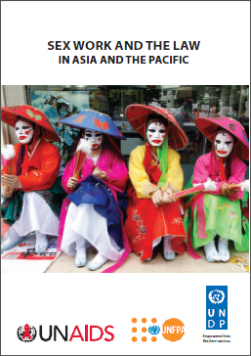
By Brian Bonci
A new report from three UN agencies, “Sex Work and the Law,” finds no evidence from countries of Asia and the Pacific that criminalization of sex work has prevented HIV epidemics among sex workers and their clients.” The new report, from the UN Development Programme (UNDP), the UN Population Fund (UNFPA) and UNAIDS examines 48 countries in Asia and the Pacific to assess laws, legal policies and law enforcement practices that affect the human rights of sex workers and impact on the effectiveness of HIV responses.
Furthermore, the report states that “Evidence from the jurisdictions in the region that have decriminalized sex work – New Zealand and New South Wales (Australia) – indicates that the approach of defining sex work as legitimate labor empowers sex workers, increases their access to HIV and sexual health services and is associated with very high condom use rates.”
Further findings include:
- Nearly all countries in Asia and the Pacific criminalize some aspects of sex work.
- Criminalization of sex work increases vulnerability to HIV by fuelling stigma and discrimination, limits access to sexual health services and condoms.
- Removing legal penalties for sex work allows HIV prevention and treatment programs to reach sex workers and their clients more effectively.
- Where sex work has been decriminalized, there is a greater chance for safer sex practices through occupational health and safety standards across the industry. Furthermore, there is no evidence that decriminalization has increased sex work.
The press release from UNDP is available here.
The full report can be downloaded here.




